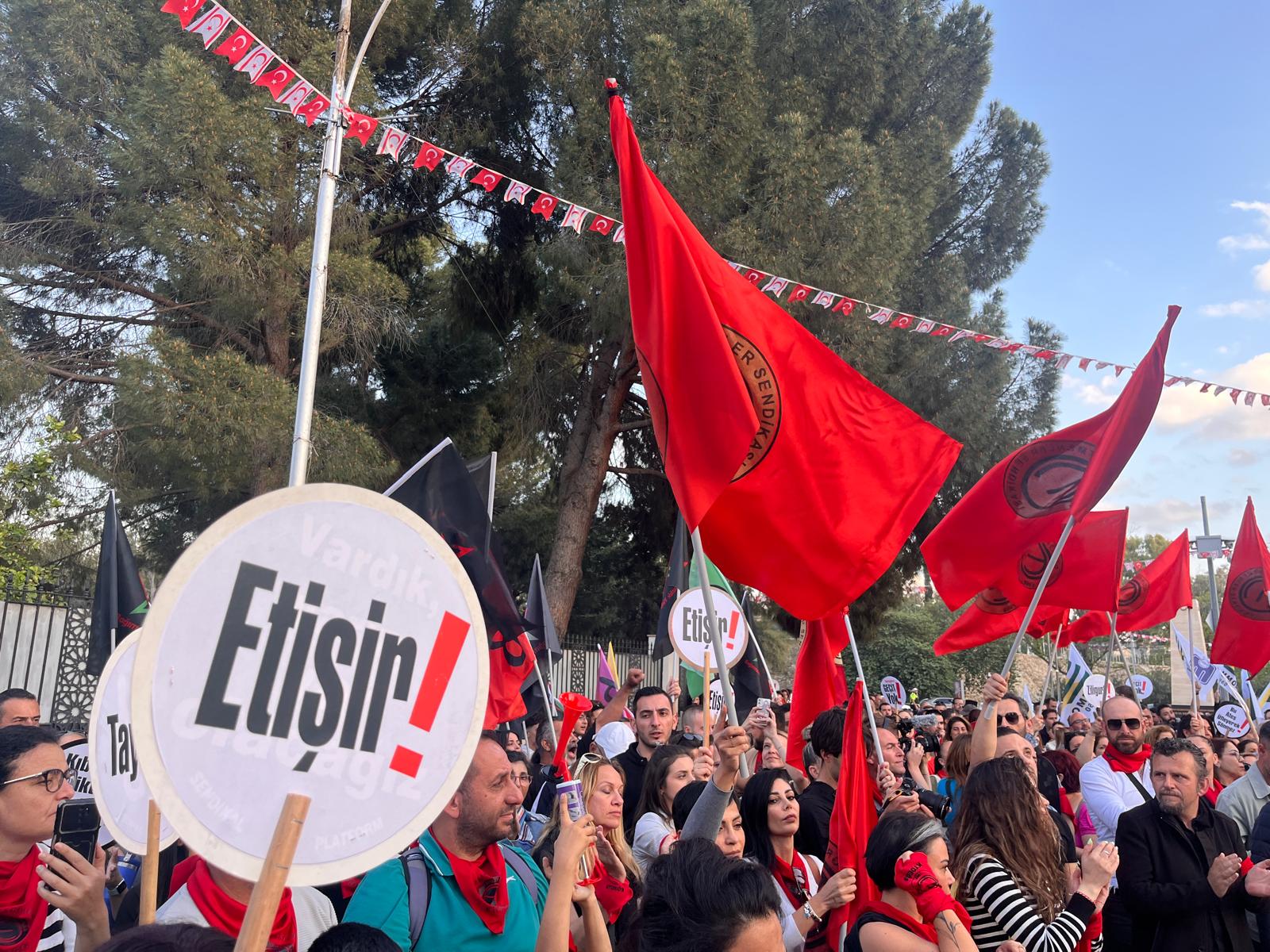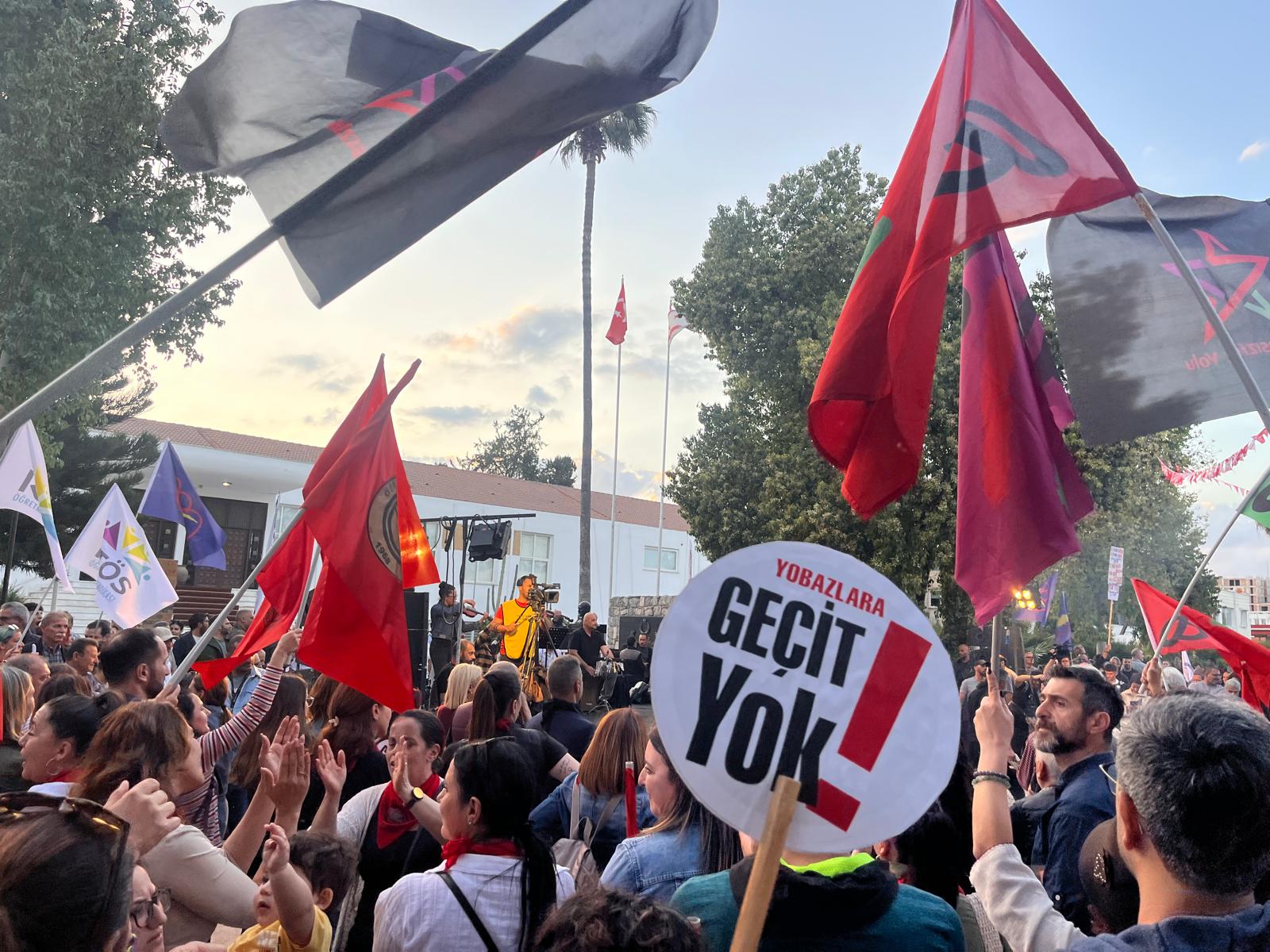The final day of the second week of protests in the north against the ruling coalition’s decision to legalise the wearing of hijabs by children at public schools saw fires lit outside the north’s ‘parliament’ for the eighth time on Friday evening.
Friday’s event is also the last planned protest before Monday, April 28, the deadline teachers and their supporters had set the ruling coalition to withdraw the law, lest their measures escalate.
Talk in recent days has been of a possible general strike, with trade unions, civil society organisations, and political parties which support the demonstration set to meet next week to decide their next steps, with the ruling coalition seemingly in no mood to withdraw the law.
One of the focal points of Friday’s event was the contribution of journalists, with a number of outlets coming together to jointly broadcast the event.
High-profile journalists including Ali Kismir, Aysemden Akin, Ertugrul Senova, Mustafa Alkan, Ulas Baris, and others were all present at the protest, with many taking to the stage to offer their thoughts on the events so far.
The journalists aside, hundreds of Turkish Cypriots once again joined the protest, with Cyprus Turkish secondary education teachers’ trade union (Ktoeos) secretary-general Tahir Gokcebel speaking to the Cyprus Mail about the people’s reaction to the fight he and his colleagues have put up against the law.
“Of course, we did not initially think people would be so accepting and leap to our defence as they have, but the Turkish Cypriot community has an accumulated energy which reflects its own will,” he began.
He also said that “there has been interference in the Turkish Cypriot culture, lifestyle, beliefs, democracy, and will for a long time”, and that “at the same time, the Turkish Cypriot community, despite being an equal partner in the Republic of Cyprus, has lost contact with the world”.
“The upper management of this place have imposed a great many things in terms of education, politics, and the economy, but they do not fit the structure of this society, so there has been a great reaction to this,” he said.
“In this latest incident, especially the abuse of girls in schools, this is actually part of the creation of a social transformation. Many other things have been done in this regard. There are imported organisations, there are illegal dormitories, there are Quran courses for young children, there are religious orders. In other words, there are things which have been done over here and in Turkey, with teachers, especially our union, starting to resist what is being done in middle schools and high schools.”
This resistance, he said, “has become a basis, and that fight has multiplied and grown”.
He added that he believes this fight “will not fade”, but that in fact, “I think these events will grow and come to enough of a result so as to allow a democracy which can manage its own will and itself can be created, where intervention in its own institutions, education, and lifestyle can be prevented”.
Asked about what he foresees for the coming days, with the deadline he and his colleagues set looming large, and Turkish President Recep Tayyip Erdogan, reportedly displeased at Turkish Cypriot teachers and their supporters, set to visit next Saturday, he chose to look through something of a longer lens.
“The matter of the law is not just about the law itself. In other words, it is actually a group of things, and this understanding which is trying to transform the Turkish Cypriot community has been imposed through this latest law,” he said.
“What is being done in places such as the theology college or at the palace complex is actually another version of that law. The fight which has been carried out after that law is to have it withdraw. Whether that happens or not, even if they do not withdraw it in a short time, society’s reaction is important and it will yield results,” he said.
He added that if the law is not withdrawn, “I do not think there can be a government which can find itself against this fight which can carry it further”.
On Turkey, he said that “we believe that a very strong message has been given to Turkey and the AKP government from here”, AKP” being the name colloquially given to Turkey’s ruling AK Party by its deriders.







Click here to change your cookie preferences